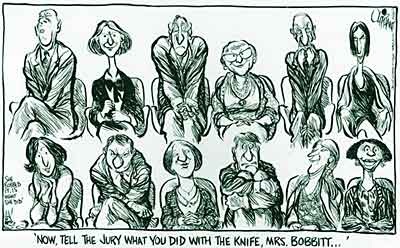In suits at common law, where the value in controversy shall exceed twenty dollars, the right of trial by jury shall be preserved, and no fact tried by a jury, shall be otherwise reexamined in any court of the United States, than according to the rules of the common law.
Prior to the Glorious Revolution of 1688, English judges were seen as "lions under the throne",,servile creatures of the King. As English judges held their sinecures at the pleasure of the King, they were sometimes biased in favor of the King and did not always make their rulings in an impartial manner. As such, the jury was an essential countervailing force against tyranny, insofar as the jury had every right to ignore a judge's instructions, thwarting even the will of the King. William Blackstone wrote that it was "the most transcendent privilege which any subject can enjoy, or wish for, that he cannot be affected either in his property, his liberty, or his person, but by the unanimous consent of twelve of his neighbors and equals.
Prior to the Glorious Revolution of 1688, English judges were seen as "lions under the throne",,servile creatures of the King. As English judges held their sinecures at the pleasure of the King, they were sometimes biased in favor of the King and did not always make their rulings in an impartial manner. As such, the jury was an essential countervailing force against tyranny, insofar as the jury had every right to ignore a judge's instructions, thwarting even the will of the King. William Blackstone wrote that it was "the most transcendent privilege which any subject can enjoy, or wish for, that he cannot be affected either in his property, his liberty, or his person, but by the unanimous consent of twelve of his neighbors and equals.

